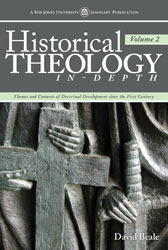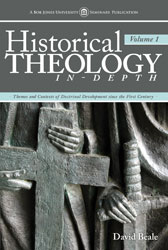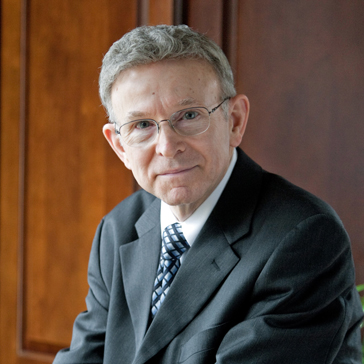Author Interview
Recently BJU Press released Dr. David Beale’s handsome new Historical Theology In-Depth: Themes and Contexts of Doctrinal Development since the First Century (2 volumes: 544 and 516 pages, respectively). We love Historical Theology here, and this kind of achievement does not happen every day. So we contacted Dr. Beale and asked to talk shop, and we were happy that he was willing to speak to our readers.
Books At a Glance (Fred Zaspel):
Dr. Beale, first we’d like our readers to get to know you. Please tell us about your career — where and how long have you been teaching Church History and Historical Theology? We assume this book reflects something of your own classroom labors — about how many times have you taught a course on Historical Theology? Are you still actively teaching? What is your current status?
David Beale:
First, I wish to express appreciation for Books at a Glance. This website should quickly become the first source for those of us who try to stay abreast with Christian literature. Thank you for the question. My classroom ministry at BJU Seminary spanned from 1973 to 2012. Since then, my primary ministry for the Seminary has been researching and writing books. I taught historical theology each semester (3 hours per semester) for thirty-five years. The second semester always began with the Reformation. Besides writing, I stay active in the local church, conduct conferences, seminars, and module courses in schools and churches.
Books At a Glance:
What have been your own areas of leading interest? Are there particular eras or events or figures in Church History that have captured your attention more than others? What other books related to Church History have you authored?
David Beale:
My PhD dissertation is titled “Ante-Nicene Eschatology: An Historical and Theological Analysis.” My deepest interests have been tied both to the earliest and the most recent eras: church fathers and modern trends. Previous books that I authored include these:
(1) In Pursuit of Purity: American Fundamentalism since 1850;
(2) The Mayflower Pilgrims: Roots of Puritan, Presbyterian, Congregationalist, and Baptist Heritage;
(3) A Pictorial History of Our English Bible.
Among the courses that I taught, my top favorite has been Historical Theology. Courses close behind that one include: Patrology, Creeds and Confessions, Baptist History, American Church History, and Prayer and Revival. My favorite travels have included Israel and the European Continent, but these two have been nearest my heart: (1) conducting study tours in Turkey and (2) conducting “Mayflower Study Tours” in the British Isles and the Netherlands.
 Books At a Glance:
Books At a Glance:
What do you think is the value of Historical Theology in the local church? How might some knowledge of Historical Theology be beneficial to the Christian in the pew?
David Beale:
Historical Theology teaches the believer how to choose his words wisely and to nuance his expressions accordingly. Virtually every phrase of our Christian confessions and creeds, such as the Chalcedonian, has been a theological battleground. Every word or phrase has its raison d’être. Likewise, as we articulate the cause of our Lord Jesus Christ, every “yea” or “nay” can become a candidate for scrutiny ad infinitum. Historical Theology is the indispensable introduction to Systematic Theology. It becomes a powerful tool for edifying the saints to do the work of the ministry. Alongside the Bible, it becomes an effective apologetical tool in evangelism and missions. Utilized with humility and submission to the Holy Spirit, this tool can equip the believer with confidence and eagerness to expand his knowledge of the Word of Truth. Historical Theology also sharpens any pastor’s use of illustrations. It will influence every sermon we preach.
Books At a Glance:
Speaking just in broad strokes, how might we characterize the development of Christian theology over the centuries of the church? Can we trace a certain process? Was there a logical progression to it all? If so, are there indications that the church was conscious of it at times?
David Beale:
In the midst of theological turning points, the church is generally unaware of the scope of God’s providential working. We speak of theology as being “historical,” because doctrinal error and doctrinal illumination are ongoing and coexistent. Studying it enables us to recognize the subtle distinctions between truth and error and between error and heresy. The history of theology is a history of challenge and response. It reveals satanic challenges to truth and Christian responses to error down through the ages. It helps us to understand who we are and what is important to God.
Books At a Glance:
We can’t talk Historical Theology long before we mention Augustine. Augustine is often said to be the most influential theologian in the history of the church. Can you briefly explain how this is so? What are the areas of his influence? Are there any other figures in church history that rival his influence?
David Beale:
Augustine has influenced Protestants by his teaching on the sacraments, but most powerfully by his teaching on the depths of man’s depravity, on the heights of God’s electing grace, and on the adoration of God as absolutely sovereign and righteous in all His ways. On the other hand, Augustine contributed immensely to the development of Roman Catholicism in both doctrine and practice. Not only was he the Father of Roman Catholic Scholasticism and Mysticism, he also set the standard for the full development of Roman Catholic dogma at the Council of Trent in the sixteenth century. While Augustine appears unrivaled in the breadth of his influence upon church history, numerous theologians and pastors such as Martin Luther, John Calvin, and Jonathan Edwards have surpassed him in balance, precision, and depth.
 Books At a Glance:
Books At a Glance:
Speaking specifically of your new work, how does your Historical Theology In-Depth differ from other textbooks on Historical Theology? What contribution(s) did you hope to make?
David Beale:
Students often expressed the need for a Historical Theology text that goes beyond a survey. In concurrence, I have included issue-related discussions on topics such as justification by faith, transubstantiation, the Sabbath Day, and Abraham Kuyper. Such chapters serve to illustrate the practical use of historical theology. Also, in order for students to grasp issues, they need sufficient context, which enables them mentally to transform themselves into historical landscapes. Without a sufficient philosophical, political, and ecclesiastical context, there is no proper landscape on which one can think through each theological issue. Proper context will provide substance and depth to outlines. Thus, we packaged the set with a sub-title that offers Themes and Contexts of Doctrinal Development since the First Century.
Books At a Glance:
We noticed curiously that in a series of appendices you devoted an uncommon amount of space to the doctrine of creation (and related questions) as it has been understood in the history of the church. Since Darwin, of course, this has been a very controversial issue — and in our own day it remains so. What aspects of creation have been the point of controversy in the past? And are there some general observations can you give us from your study that would shed light on today’s quarrels?
David Beale:
Vital issues today include the length of the creation-days, the age of the earth, and the scope of the flood. The vastness of patristic and medieval literature makes it impossible for the average Christian today to discover for himself the corpus of ecclesiastical literature on such issues. In four appendices we have provided the essential data. In the data, one will find fascinating reading, including the five church fathers who thought the earth was flat. Such was an odd distraction and it was outside the mainstream. Indeed, it is not until the nineteenth century that we find any departure from the consistent conviction that God created ex nihilo the heavens and the earth in six literal twenty-four hour days. Only three church fathers held to allegorical days of creation, and all three insisted on a young earth. No church father denies a young earth. The same conviction continues through the Reformation Era and into the Modern Era. In the wake of the publication of Darwin’s evolutionary hypothesis, aberrant systems such as long-day creation, the gap theory, and progressive or theistic creation began making inroads into Christian schools and churches.
Books At a Glance:
While we’re on this subject, the historicity of Adam has become an issue in our day. Can you speak to this question for us, as an historian? Have there been significant Christian theologians who understood Adam as anything other than an historical person? Are evolutionary-oriented explanations the only exceptions?
David Beale:
The most significant is German theologian Karl Barth (1886-1968). A section of my second volume discusses his teachings. Barth denied the historicity of much of the Bible, including the creation account, Adam’s fall, and even Christ’s resurrection. Evolution happened, according to Barth. For him, the Bible’s saga of sin and rhyme of redemption are errant and fallible. How do these things affect us? Most importantly, we must remember that the battle is over the Bible, and the common denominator of every theological issue is hermeneutics. We must learn from the past, act wisely in the present, and preach the whole, eternal counsel of God without compromise.
Buy the books

Historical Theology In-depth, 2 Vols
